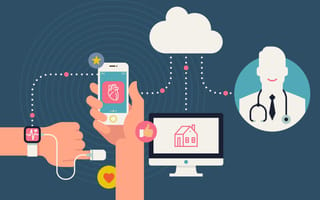Near and far, the pandemic has shifted the way we do things — from communicating with loved ones to completing daily tasks like working and grocery shopping. Alongside us, many industries have had to adapt to changes as well. Restaurants, for example, developed convenient takeaway options, while businesses big and small streamlined online ordering processes.
Within the healthcare industry, many companies were faced with the challenge of relying much more heavily on technology. Demand quickly grew for virtual appointments to allow for more accessibility and widespread care, while digital health records became the baseline expectation for patients and providers alike.
Well before the pandemic, between healthcare apps and the adoption of AI, healthtech was already seeing major growth. But what about the data these technologies have since accumulated? What role has the pandemic played in the relationship between healthtech and data? The pandemic triggered a rapid and significant influx of data in order to better track and report on it in real-time. According to health data platform provider Human API, the industry has been disrupted, and as a result, various and seemingly unrelated industries require that data be shared.
The need for health data has never been greater, and healthtech’s ability to meet it has never been so possible. We spoke with Andrei Pop, founding CEO of Human API, to discuss the wave of change that has followed health data in the global pandemic, how the company adapted its product in light of it and what we can expect from healthtech as we continue to move forward from Covid-19.
What changed for your business and industry in 2020, and how much of that was driven by the global pandemic and the impacts that had on consumer behavior?
It goes without saying that 2020 had a profound impact on much of the world around us, and this included access to social services. Many industries that required consumer health data were disrupted by the absence of the traditional means of acquiring that health data, such as a house call for a life insurance lab exam. With these disruptions came a dramatic shift to the use of electronic health data. There were also new dependencies for the use of health data in transactions that had never required it prior. Getting on a flight to Hawaii suddenly required proof of a Covid-19 lab test or immunization.
These shifts created significant opportunities for our company, platform and network to fill the gaps and give consumers secure, digital access to share their health data to get that insurance policy or get on that flight. It also became clear that, in many cases, these transactions were faster and easier for consumers and companies alike, prompting lasting change in the consumer experience of health data.
How did you adapt your product to address these shifting trends?
Luckily for us, our product was well positioned to meet these shifting trends, but that does not mean we didn’t have our work cut out for us. First and foremost, we needed to rapidly bring a brand-new solution to market to meet the needs of a new real-time health verification process. This included dramatically growing our network to securely access Covid-19 lab test and vaccine data to allow consumers to share that data — and only that data. It also included the innovation of new consumer experiences to find their related health information, which was a complex problem to solve with the rapid deployment of Covid vaccinations across a myriad of health sources.
The lasting impact of these trends also caused us to innovate our product to meet both the needs of our enterprise customers and other groups. With the proliferation of electronic health data usage came the question of how this data can be truly leveraged by companies large and small to fulfill these consumer transactions. Data access was only the beginning, and it focused our energies on additional capabilities to drive industry-specific innovation, such as ensuring a life insurance policy can indeed be fulfilled.
New digital health applications, telemedicine care, virtual clinical trials and portable health wallets are all part of the new direction of healthtech."
Looking ahead, what lasting effects do you think the pandemic will have on your business and industry? And how do you plan to be part of this next wave of healthtech innovation?
We believe the pandemic simply accelerated the innovation of electronic health data usage, and while the tides may recede to a certain degree, the effects will indeed be lasting. New digital health applications, telemedicine care, virtual clinical trials and portable health wallets are all part of the new direction of healthtech.
Our position remains the same: We will deliver trusted and meaningful consumer experiences with enterprise companies. As new solutions and products come to market that provide value to consumers using their own health data, the demand for our platform will grow. And we will continue to focus on platform capabilities that don’t just contemplate access to data, but power the solutions needed to drive true innovation.







